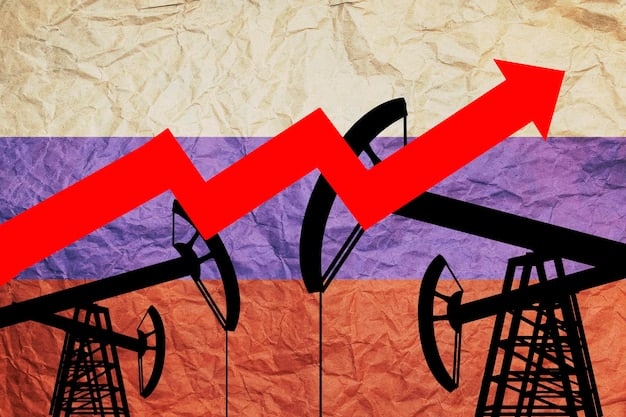Russia-Ukraine War Impact: US Energy Security Strategies for 2025

The Impact of the Russia-Ukraine War on US Energy Security: Strategies for Mitigation in 2025 focuses on analyzing the disruptions caused by the conflict and proposes a range of strategic approaches, including diversifying energy sources, increasing domestic production, and investing in renewable energy and energy efficiency measures, to mitigate potential risks and ensure a stable and secure energy supply for the United States.
The ongoing Russia-Ukraine war has sent ripples across the globe, and the impact of the Russia-Ukraine War on US Energy Security: Strategies for Mitigation in 2025 is a pressing concern. This article delves into the challenges and potential solutions for ensuring a stable energy supply for the United States in the face of this geopolitical crisis.
Understanding the Russia-Ukraine War’s Impact on Global Energy Markets
The Russia-Ukraine war has created significant volatility and uncertainty in global energy markets. As a major energy producer, Russia’s involvement in the conflict has disrupted supply chains, increased prices, and raised concerns about the reliability of energy exports to Europe and beyond. This situation has far-reaching consequences, influencing energy security strategies worldwide, including in the United States.
Europe’s reliance on Russian natural gas has been particularly exposed, leading to a scramble for alternative sources and a renewed focus on energy independence. This shift in the global energy landscape directly impacts the United States, as it affects international energy prices, trade flows, and geopolitical alliances. The US must therefore carefully assess the effects of the war to adapt and secure its energy future.

Disruptions to Global Supply Chains
The conflict has caused significant disruptions to global supply chains, particularly for crude oil and natural gas. Sanctions, infrastructure damage, and logistical challenges have all contributed to reduced production and exports from Russia.
Impact on Energy Prices
Reduced supply and increased demand have driven up energy prices globally. This has resulted in higher costs for consumers and businesses, impacting economic growth and creating inflationary pressures. The US is, therefore, compelled to strategize innovative ways to combat these financial pressures.
- Price Volatility: Rapid fluctuations in energy prices create uncertainty for businesses and consumers.
- Inflationary Pressures: Higher energy costs contribute to overall inflation, reducing purchasing power.
- Economic Slowdown: Increased energy costs can stifle economic growth by raising production costs.
In conclusion, the Russia-Ukraine war has had a substantial impact on global energy markets by causing disturbances to supply chains and increasing prices. The US needs to be strategic and come up with mitigating strategies.
Assessing US Energy Security in the Context of Geopolitical Instability
US energy security is defined as the availability of reliable, affordable, and sustainable energy supplies to meet the nation’s needs. Geopolitical instability, such as the Russia-Ukraine war, can pose significant threats to this security by disrupting supply chains, increasing price volatility, and creating geopolitical risks.
The US has historically relied on a mix of domestic production and imports to meet its energy demands. However, the war has underscored the importance of reducing reliance on foreign sources, especially those from politically unstable regions. Diversifying energy sources and increasing domestic production are key strategies for enhancing US energy security in the face of geopolitical uncertainty.
Vulnerabilities in the US Energy System
Several vulnerabilities exist within the US energy system that could be exacerbated by geopolitical instability such as the Russia-Ukraine war.
Dependence on Foreign Oil
While the US has significantly increased its domestic oil production in recent years, it remains a net importer of crude oil. The US imports 8.29 million barrels per day currently, according to the U.S. Energy Information Administration.
- Price Shocks: Dependence on foreign oil exposes the US to price shocks caused by geopolitical events.
- Supply Disruptions: Supply disruptions in key oil-producing regions can impact US energy supplies.
- Geopolitical Leverage: Reliance on certain countries for oil can give those countries geopolitical leverage over the US.
In sum, it’s important to assess threats to US energy security. With the Russia-Ukraine war, the US must address vulnerabilities such as dependence on foreign oil. By identifying these weaknesses, the US can develop targeted strategies to bolster its energy security amidst geopolitical uncertainty.
Diversifying Energy Sources: A Pathway to Resilience
Diversifying energy sources is a crucial strategy for enhancing US energy security and reducing vulnerability to geopolitical risks. By expanding its energy mix to include a wider range of sources, the US can reduce its reliance on any single energy source, bolster resilience to supply disruptions, and stimulate innovation in the energy sector.
Renewable energy sources, such as solar, wind, hydro, and geothermal, offer a particularly promising pathway to diversification. These resources are abundant, domestically available, and environmentally sustainable, making them ideal candidates to fortify US energy security while simultaneously reducing carbon emissions and promoting climate change mitigation.

Investing in Renewable Energy
Increased investment in renewable energy infrastructure is essential for diversifying the US energy mix. This includes developing new renewable energy projects, upgrading existing infrastructure, and providing incentives for renewable energy adoption.
Promoting Energy Efficiency
Energy efficiency measures can significantly reduce overall energy demand, lessening reliance on energy imports and enhancing resilience to supply disruptions. This includes improving building codes, promoting energy-efficient appliances, and investing in public transportation.
- Reduced Demand: Energy efficiency reduces overall energy demand, minimizing reliance on imports.
- Cost Savings: Energy-efficient technologies and practices can save consumers and businesses money.
- Environmental Benefits: Energy efficiency reduces carbon emissions and improves air quality.
In conclusion, diversifying energy sources, especially through renewable energy and energy efficiency can reduce reliance on single sources and strengthen resilience.
Boosting Domestic Energy Production: Oil, Natural Gas, and Beyond
Boosting domestic energy production is another pillar of US energy security, providing greater control over energy supplies and reducing dependence on foreign sources. While renewable energy holds long-term promise, expanding domestic production of oil, natural gas, and other resources can help bridge the gap and ensure reliable energy supplies in the near term. This could involve expanding oil and gas drilling operations, promoting coal production, and developing alternative energy technologies.
However, increased domestic energy production should be balanced with environmental concerns and sustainability goals. Implementing responsible drilling practices, investing in carbon capture technologies, and promoting energy efficiency can help mitigate the environmental impacts of increased energy production while still enhancing energy security. The government must have a sound long-term strategy in place.
Expanding Oil and Gas Drilling
Expanding oil and gas drilling operations on both public and private lands can increase domestic energy production. This requires streamlining permitting processes, opening new areas for exploration, and providing incentives for increased production.
Investing in Carbon Capture Technologies
Carbon capture technologies can capture carbon dioxide emissions from power plants and industrial facilities, preventing them from entering the atmosphere. Investing in these technologies can help reduce the environmental impact of fossil fuel production and use.
- Emission Reduction: Carbon capture technologies can significantly reduce carbon emissions.
- Fossil Fuel Use: These technologies allow for continued use of fossil fuels with reduced environmental impact.
- Economic Opportunities: Investment in carbon capture can create jobs and stimulate economic growth.
Overall, the US can boost domestic production through expanding oil and gas drilling, while also investing in carbon capture technologies. This can lead to US energy independence and better energy security.
Strengthening Energy Infrastructure: Resilience and Modernization
A robust and resilient energy infrastructure is essential for ensuring reliable energy supplies and withstanding disruptions caused by geopolitical events, natural disasters, and cyberattacks. The US energy infrastructure, including pipelines, power grids, and storage facilities, is aging and in need of modernization. Investing in infrastructure upgrades, cybersecurity enhancements, and resilience measures is crucial for safeguarding US energy security.
Modernizing the grid to incorporate more renewable energy sources and distributed generation is a key priority. This includes upgrading transmission lines, implementing smart grid technologies, and developing energy storage solutions. Furthermore, strengthening cybersecurity defenses is essential to protect against cyberattacks that could disrupt energy supplies and compromise critical infrastructure.
Upgrading Transmission Lines
Upgrading transmission lines is necessary to transport electricity from renewable energy sources to population centers. This requires investing in new transmission infrastructure and improving the efficiency of existing lines.
Implementing Smart Grid Technologies
Smart grid technologies can improve the efficiency and reliability of the grid by enabling real-time monitoring, automated control, and two-way communication between utilities and consumers. This includes installing smart meters, deploying advanced sensors, and implementing demand response programs.
- Increased Efficiency: Smart grids improve energy efficiency by optimizing energy use and reducing waste.
- Enhanced Reliability: Smart grids enhance grid reliability by enabling quick detection and response to disruptions.
- Consumer Empowerment: Smart grids empower consumers by providing them with more information about their energy usage.
In conclusion, strengthening energy infrastructure through upgrades and technological implementation can ensure reliability in the energy sector. Overall, this will lead to a modern and stronger energy economy for the US.
International Cooperation: Collaboration for Energy Security
International cooperation is essential for addressing global energy challenges and promoting energy security in an interconnected world. The US can work with allies and partners to diversify energy supplies, coordinate emergency response efforts, and promote energy efficiency and renewable energy deployment on a global scale.
Engaging in international dialogues and forums, such as the International Energy Agency (IEA) and the G7, can help foster cooperation and coordination on energy security issues. This includes sharing best practices, aligning energy policies, and coordinating efforts to address supply disruptions and price volatility. US should take advantage of any collaborative measure.
Working with Allies
Collaborating with allies to coordinate energy policies and diversify energy supplies is crucial. This includes working with countries in Europe, Asia, and the Americas to promote energy security and reduce dependence on any single supplier.
Coordinating Emergency Response
Coordinating emergency response efforts with international partners can help mitigate the impact of energy supply disruptions. This includes sharing information, coordinating the release of strategic petroleum reserves, and providing mutual assistance.
- Supply Diversification: International cooperation can help diversify energy supplies, reducing reliance on single suppliers.
- Emergency Response: Coordinated emergency response efforts can mitigate the impact of supply disruptions.
- Policy Alignment: Sharing best practices and aligning energy policies can promote energy security globally.
To summarize, international cooperation is vital to global energy security. The US can partner with other countries to promote a more resilient and stable energy future. By partnering internationally, the US can better ensure its energy future.
| Key Aspect | Brief Description |
|---|---|
| 🌍 Geopolitical Impacts | Russia-Ukraine conflict disrupts global energy markets affecting the US. |
| ⚡ Diversification | Shifting to renewable energy sources reduces dependency on volatile markets. |
| 🏭 Domestic Production | Boosting US energy output can buffer against international supply shocks. |
| 🤝 International Collaboration | Alliances safeguard energy security. |
Frequently Asked Questions
▼
The war has disrupted the flow of natural gas and oil from Russia to Europe, causing price increases and supply shortages. Sanctions and infrastructure damage have further exacerbated the situation.
▼
The US can increase domestic oil production, invest in renewable energy sources, and promote energy efficiency measures to reduce its reliance on foreign oil. International cooperation will be key.
▼
Renewable energy sources such as solar, wind, and hydro are domestically available and environmentally sustainable. Shifting to renewables reduces dependence on volatile markets and enhances energy independence.
▼
Energy efficiency measures reduce overall energy demand, minimizing reliance on imports and enhancing resilience to supply disruptions. Investing in energy-efficient technologies saves costs as well.
▼
International cooperation promotes supply diversification, coordinated emergency response, and policy alignment. Collaborating with allies can reduce dependence on single suppliers.
Conclusion
In conclusion, the impact of the Russia-Ukraine War on US Energy Security: Strategies for Mitigation in 2025 underscores the urgent need for a comprehensive approach to enhance US energy security. Diversifying energy sources, boosting domestic production, investing in resilient infrastructure, and prioritizing international cooperation are essential steps. By adapting to these challenges and implementing proactive strategies, the US can mitigate the risks posed by geopolitical instability and secure a stable and sustainable energy future.





